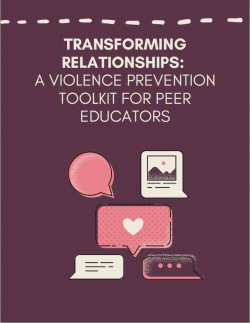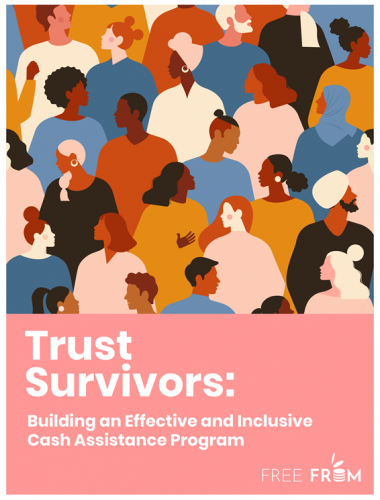Resources Library: Model Policies & Best Practices
Start a Search:
Transforming Relationships: A Violence Prevention Toolkit for Peer Educators

This document serves as a tool for young adults and supportive professional staff who want to cultivate safer thriving communities on their college campuses. The goal is to empower student leaders to use their knowledge and skills to make transformative change, which will aid their own development as well as pave the way for future classes of students to do the same. The toolkit dives into foundational knowledge, key frameworks, and activities for peer educators to use in their programming.
Trauma-Informed Birth Support: Survivor + Doula + Advocate
This pamphlet reviews the connections between pregnancy, childbirth, and trauma, and offers information, resources, and tips for advocates and birth doulas to support trauma-informed birth experiences for survivors of domestic violence. Published by the National Resource Center on Domestic Violence
Tribal Implementation of VAWA
This page from the National Congress of American Indians helps to briefly review the application of VAWA as it relates to Tribal communities. Their intent is to push for more inclusion of tribe rights and power to enforce legal and community action towards those who are not included in the VAWA understanding of sexual violence. Current law only allows for tribes to act to address domestic violence towards women only, and limits the ability to prosecute offenders who are not tribal members.
Trust Survivors: Building an Effective and Inclusive Cash Assistance Program

FreeFrom, a national organization, based in Los Angeles, with a mission to dismantle the nexus between intimate partner violence and financial insecurity, has created their groundbreaking report that compiles data and stories from 1,000 surviors about how to make cash assistance work for them.
The Biden-Harris Administration has pledged $5 billion to be used as direct cash assistance for survivors. At FreeFrom, they are thrilled about this promise as it is known from experience that survivors’ #1 need is cash to spend as they see fit.
To help the Biden-Harris Administration design a survivor-centered program, FreeFrom asked an incredibly diverse sample of survivors what they need and overwhelmingly, they expressed that they need a program steeped in flexibility and trust.
Some key takeaways from the data:
- 71% of survivors were not seeking support from a domestic violence or sexual assault organization when they applied for a Safety Fund grant;
- 53% of survivors report that they do not have any “proof” that they are a survivor (e.g., police report or restraining / protective order);
- 68% of survivors can’t or don’t feel safe getting a police report;
- 69% of survivors can’t or don’t feel safe getting a restraining / protective order;
- 84% of survivors would not be able to access cash assistance if they had to meet certain added eligibility requirements beyond their experience of harm.
Download the report by clicking on the file below.
Understanding Protective Orders in Virginia: What you need to know

This video, “Understanding Protective Orders in Virginia: What you need to know” is a useful resource for anyone with a family abuse protective order in Virginia. This video aims to make information about protective orders more accessible to both petitioners (individuals seeking to be protected) and respondents (individuals who the protective order is filed against). It explains definitions, conditions, and Virginia law related to protective orders in plain language and is available in English (with or without captions) Spanish.
NOTE: This video was created in July 2020 and state and federal law may have changed. The video was created as a project of the Pulaski Juvenile and Domestic Relations District Court Domestic Violence Docket with funded in part by a V-STOP award #15-M4161VA14 and #20-Q4161 VA-19 awarded to the Office of the Executive Secretary of the Supreme Court of Virginia from funds authorized by the federal Violence Against Women Act awarded to Virginia by the U.S. Department of Justice. Opinions or points of view expressed do not necessarily represent those of DCJS, OES, or the U.S. Dept. of Justice.
Click here to view the video in ENGLISH.

